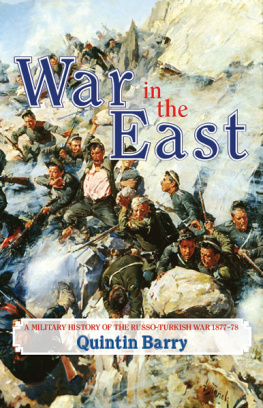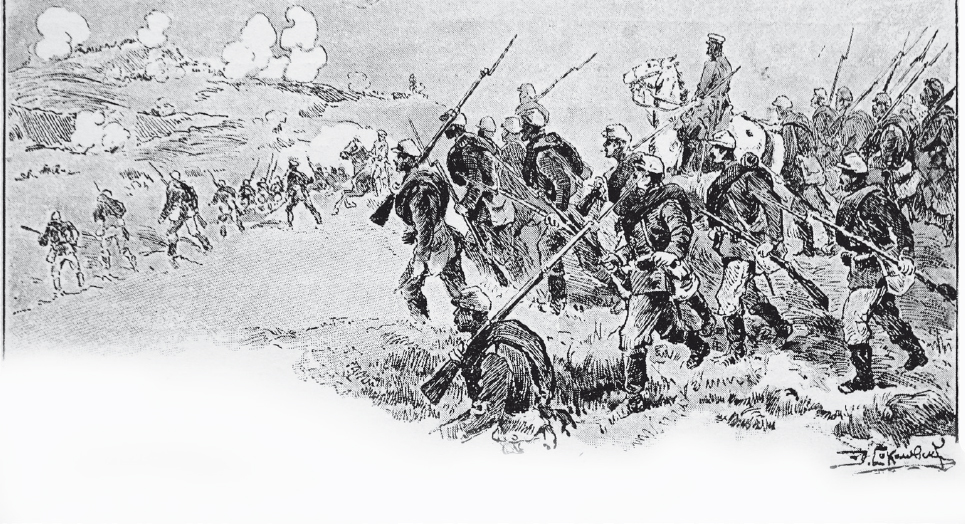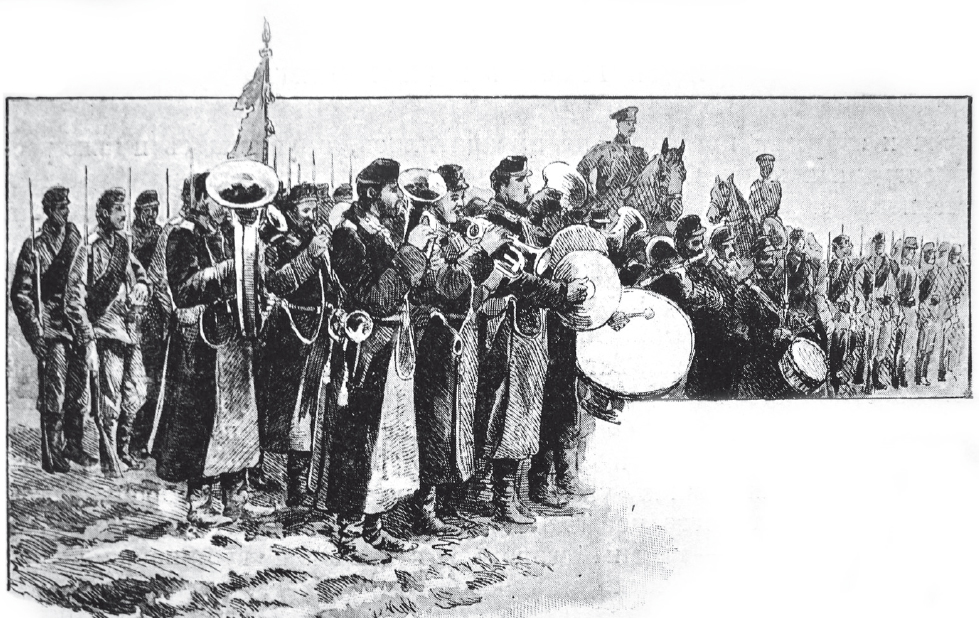By the same author:
The Franco-Prussian War Volume 1: The Campaign of Sedan. Helmuth von Moltke and the
Overthrow of the Second Empire
The Franco-Prussian War Volume 2: After Sedan. Helmuth von Moltke and the Defeat of the
Government of National Defence
The Road to Kniggrtz. Helmuth von Moltke and the Austro-Prussian War 1866
Helion & Company Limited
26 Willow Road
Solihull
West Midlands B91 1UE
England
Tel. 0121 705 3393
Fax 0121 711 4075
Email:
Website: www.helion.co.uk
Published by Helion & Company 2012
Designed and typeset by Farr out Publications, Wokingham, Berkshire
Cover designed by Farr out Publications, Wokingham, Berkshire
Printed by Gutenberg Press Limited, Tarxien, Malta
Quintin Barry 2011
Covers: The defence of the eagles eyrie, Shipka Pass, August 23 1877. (Andrei Popov,
1893)
ISBN: 978 1 907677 11 3
EPUB ISBN: 978 1 910294 15 4
British Library Cataloguing-in-Publication Data.
A catalogue record for this book is available from the British Library.
All rights reserved. No part of this publication may be reproduced, stored in a
retrieval system,or transmitted, in any form, or by any means, electronic, mechanical,
photocopying, recording or otherwise, without the express written consent of Helion &
Company Limited.
For details of other military history titles published by Helion & Company Limited
contact the above address, or visit our website: http://www.helion.co.uk.
We always welcome receiving book proposals from prospective authors.
To my Father and Mother
Contents
List of Illustrations
Colour plates
Images within the text
Images in colour maps section
Key to sources
Anon Album della Guerra Russo-Turca del 1877-78 (Milan, 1878)
Anon Histoire de la Guerre dOrient 1877-1878 (Brussels, 1878)
Anon Russes et Turcs. Guerre dOrient (Paris 1878, 2 volumes)
Budev Grabados Espaoles de la Guerra Ruso-Turco de 1877-1878 (Sofia, 1977)
Bullard Famous War Correspondents (Boston 1914)
Faur Histoire de la Guerre dOrient (1877-1878) (Paris, 1878, 2 vols)
The Graphic 1876-78
Hozier The Russo-Turkish War. Including an Account of the Rise and Decline of the Ottoman Power, and the History of the Eastern Question (London nd, 5 volumes)
Illustrated London News 1876-78
Ollier Cassells Illustrated History of the Russo-Turkish War (London nd, 2 volumes)
Rogers original photographs and other material from the collection of Duncan Rogers
Springer Der Russisch-trkische Krieg 1877-1878 in Europa (Vienna, 1891-93, 7 volumes)
Strantz Illustrirte Kriegs-Chronik. Gedenkbuch an den Russisch-Trkischen Feldzug von 1876-1878 (Leipzig, 1878)
Wellesley With the Russians in Peace and War: Recollections of a Military Attach (London 1905)
Zimmermann Illustrirte Geschichte des Orientalischen Krieges von 1876-1878 (Vienna 1878)
List of Maps
The following appear in a colour section
All maps from Greene Report on the Russian Army and its Campaigns in Turkey in 1877-1878 (New York, 1879, atlas volume)
Acknowledgements
I am glad to have this opportunity of expressing my gratitude to all those who have helped me in the preparation of this book, a number of whom, in no special order, deserve my particular thanks. Tim Readman read through the final draft and made a number of valuable suggestions.
Jean Hawkes once again overcame all the difficulties caused by my execrable handwriting (and on this occasion also the problems of very unfamiliar names of places and individuals) in patiently typing the book.
Colonel Ali Denizli of the Turkish Army (retd) gave valuable assistance on several aspects of the history of the Ottoman Army. In Plevna, Nicolay Petrov was a most helpful and courteous guide to the Panorama there, and subsequently assisted on a number of points relating to the Bulgarian Legion. In Bucharest, Alina Lefter helped me in explaining the use of some Roumanian military terms. Bob Williams provided invaluable help, particularly with the proper transliteration of Russian names, which I was able to include in the glossary.
As always I am greatly indebted to Duncan Rogers of Helion, who offered continual encouragement and support throughout the writing of the book. In particular he has been instrumental in the matter of illustrations and maps. On this occasion he has surpassed himself. Finally, my family have been patient and supportive throughout the project.
Preface
T he Russian and Ottoman Empires clashed repeatedly during the 19th Century. It was a process that progressively weakened the Ottoman Empire and rolled back its frontier from the high tide mark of its expansion. Only when supported by powerful allies during the Crimean War of 18541856 did the Turks end on the winning side. The war of 18771878 was the latest in a series of conflicts caused principally by the relentless ambition of the Russian Empire. Russian concern for the subject Slav peoples of the Ottoman Empire was an ostensible, though subsidiary, motive for military action.
It was a brutal war, involving very substantial armies and enormous casualties on both sides, fought in conditions that were almost indescribably demanding. It was portrayed in chilling detail by a host of Western observers diplomats, military attachs, artists and journalists; shocked both by the atrocities which they encountered and the gross incompetence of some of the generalship, they concluded that it was most decidedly not a European war fought between European nations.
In the years following the war it generated, understandably, a flood of books covering all its aspects; but by the dawn of the 20th Century there were other more evidently relevant wars to describe. The Russo-Turkish War ceased to be a subject for Western historians and military commentators, although it continued to receive attention in the countries of the participants. During the 20th Century the only English language narrative studies of the war were The Siege of Plevna, by Rupert Furneaux, published in 1958, which was not solely confined to the events of the siege; and the excellent Caucasian Battlefields by W E D Allen and Paul Muratoff, published in 1953, which devoted nine chapters to a penetrating and scholarly account of the campaign in the Caucasus.
I hope, therefore, that this book may go a little way to filling a historical gap, and to reviving interest both in the colossal struggle that took place in 18771878 and in its devastating consequences for the soldiers and civilian populations involved.
The Congress of Paris
O nce Sebastopol had fallen on September 11 1855 there was no good reason why the Crimean War, the fourth war in the 19th century involving Russia and Turkey, should not be brought to an end. But it was not as simple as that. All the participants were inhibited in one way or another from embarking at once on direct negotiations. For Tsar Alexander II, the recognition of military defeat was a fearful blow to Russian prestige; but Russian public opinion was dead against the war and the nations resources were severely overstrained, and it was obvious to his ministers that pride must take second place to reality. Napoleon III still had considerable ambitions to remake the map of Europe; but his ministers were determined on peace, and French public opinion was also against continuance of the war. Sooner rather than later Napoleon must bow to the inevitable. British public opinion, however, was still bellicose, and so was Lord Palmerston, not least because, unlike the French, the British army had no substantial victories to show for all its efforts. The Sardinian government had got all it needed from its participation, which ensured it could count on the favour of the Western powers. For Turkey, the Russian military threat in the Balkans had gone away, while there was nothing to be gained in the Caucasus, where things were not going well, and where the fortress of Kars finally succumbed on November 26.

















